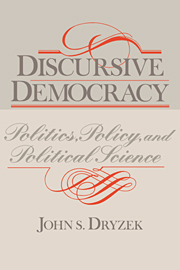9 - The Measure of Political Man - and Woman
from IV - Political Science
Published online by Cambridge University Press: 12 October 2018
Summary
If political science and political man are ill-served by the discipline's dominant method, the opinion survey, then what is the alternative? One option is a retreat from empirical study of the content and distribution of politically relevant human dispositions altogether, which would seek comfort in older forms of philosophical speculation (see, e.g., Storing, 1962). Despite the attractions of this venerable alternative, any concern with the prospects for participatory democracy and other political forms really can be informed by systematic empirical work (or so I shall argue). In this chapter I shall outline and illustrate a methodology for the empirical scrutiny of political man that is broadly consistent with the ideas about communicative rationality, critical theory, and classical politics that pervade earlier chapters. In particular, I shall try to show that this methodology can meet all the standards used to judge and condemn opinion surveying in Chapter 8.
It may surprise the more sympathetic reader of earlier chapters that the orientation I have in mind, Q methodology, involves quantification, though any statistical analysis is very much subordinate to the broader analytical and interpretive task. Quantification in social science is often regarded as the preserve of instrumental rationalists, opinion surveyors, and other suspicious characters. The result is that, as things stand, “those who can measure well too often restrict themselves to inconsequential epiphenomena, while those who complain remain steadfastly aloof” (Brown, 1985, p. 1). There is of course no reason to value quantification as such, independent of the uses to which it is actually put. I shall try to demon strate that statistical analysis can indeed find useful service in discursive democracy and critical theory.
Quantification as such is, then, no evil. It only becomes so in the uses to which it has been put by opinion researchers and others committed to causal explanation of social and political behavior. In the interests of further subverting the latter kind of social science, I shall also try to show that research programs organized around Q are more defensible qua science. Indeed, the Q approach is closer to what successful natural sciences actually do than are the opinion surveys, regression equations, and other paraphernalia beloved by those objectivists in the social disciplines who idolize what turns out to be a largely mistaken conception of successful natural science.
- Type
- Chapter
- Information
- Discursive DemocracyPolitics, Policy, and Political Science, pp. 173 - 189Publisher: Cambridge University PressPrint publication year: 1990



